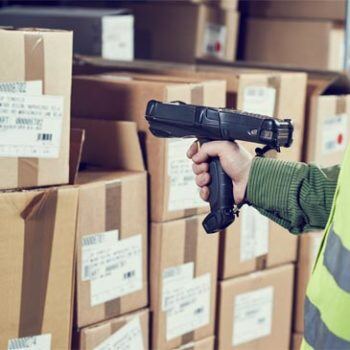
When it comes to choosing equipment for your manufacturing business, you probably don’t require a lot of outside help. If you’re looking for a new CNC lathe, for instance:
- You understand the types of products you’ll be using;
- You’re already familiar with the top brands; and
- You have valuable input from your machine operators, maintenance personnel and supervisors to help guide your decision.
When it comes to choosing barcode scanners, on the other hand, the process can be a little trickier. The reason is that there are dozens of brands and dozens of configuration possibilities, which yields thousands of options. And without the same familiarity and guidance you get on a CNC lathe purchase, you may be feeling overwhelmed with information overload.
If you’re in this situation now, you’re in luck. Global Shop Solutions barcode preferred vendor EMS Barcode has years of experience selling, implementing and supporting barcode scanning equipment, media and solutions. For several years, they’ve worked closely with Global Shop Solutions and over the past year they’ve become a preferred vendor for hardware and labels. What makes them unique is that they are not married to any one particular vendor or product. They constantly evaluate the latest hardware and media and make recommendations to our clients based on what’s best for them. And they offer this advice freely.
Here are five highlights they cover in their barcode scanning hardware consultations that can save you a lot of time and money:
- What form factor best serves your needs? A good place to start your evaluation process and narrow down your choices is to consider what kind of mobile device will optimize employee productivity. If, for example, the device will mostly be in one location (e.g. workstation or mounted to a forklift) a tablet may be the best fit. If the device is going to be used on the move to scan multiple barcode labels, on the other hand, a gun-grip or wearable device would be a better option. Need to be mobile while doing a mix of barcode scanning and data entry? A phone-size form factor will likely be the best option for you.
- Is the device built for your environment? After selecting the form factor, you need to ensure your device can hold up in the environment where it will be used. For instance, if it will be used primarily outdoors, a brighter display and water resistance/proof rating (i.e., IP65, IP66 or IP67) would be needed. Also don’t forget about battery life. Can the device last an entire shift without being charged? How quickly can the battery be swapped or charged once it’s drained?
- What are your software requirements? In general, there are two primary operating systems to consider for your barcode scanner hardware – Windows or Android. However, within these options are a myriad of “flavors”. For instance, Windows options include: Embedded, Mobile or CE. And Android has even more flavors, such as Alpha, Beta, Cupcake, Donut, Éclair, Froyo, Gingerbread and Honeycomb.
- What kind of scanning technology do you need? One of the biggest mistakes we see companies make is choosing the wrong scanner technology. There are two general classes of barcodes: 1D (one-dimensional or linear) and 2D (two-dimensional). They are used in different types of applications and sometimes require different types of technology. 1D barcodes can be scanned with traditional laser scanners or using camera-based imaging scanners. 2D barcodes, on the other hand, can only be read using images.
- How will the device update your database? Another important consideration is how quickly you need the data captured by the barcode scanner to update your database. If the answer is “once a day” then a device can be docked and tethered to a workstation to upload data at the end of the worker’s shift. If real-time updates are needed, however, you’ll need a device with a built-in Wi-Fi or cellular radio.
As mentioned earlier, this list is just a highlight of the points EMS Barcode covers during their free hardware consultation. Their trained staff will observe and get to know your business and provide specific feedback and recommendations that have helped other similar companies. They don’t have an agenda to sell a specific set of hardware or services. They take the time to understand your unique challenges and offer customized solutions to solve them.
As you get to know their company better in the following months, feel free to contact them via their website with any questions. They are available via web chat, email or phone. And keep in mind that their success depends entirely on your success.
Eric Sutter is a business development professional with more than 20 years of experience in barcoding, building solutions for asset tracking and warehouse management across a wide range of vertical markets. Sutter founded EMS Barcode Solutions on the premise that customers need more than data collection devices and software — they need solutions. By combining and integrating components such as mobile computers, software, labels, and ribbons with professional services, EMS delivers solutions that provide its customers with a tangible return on their investments.